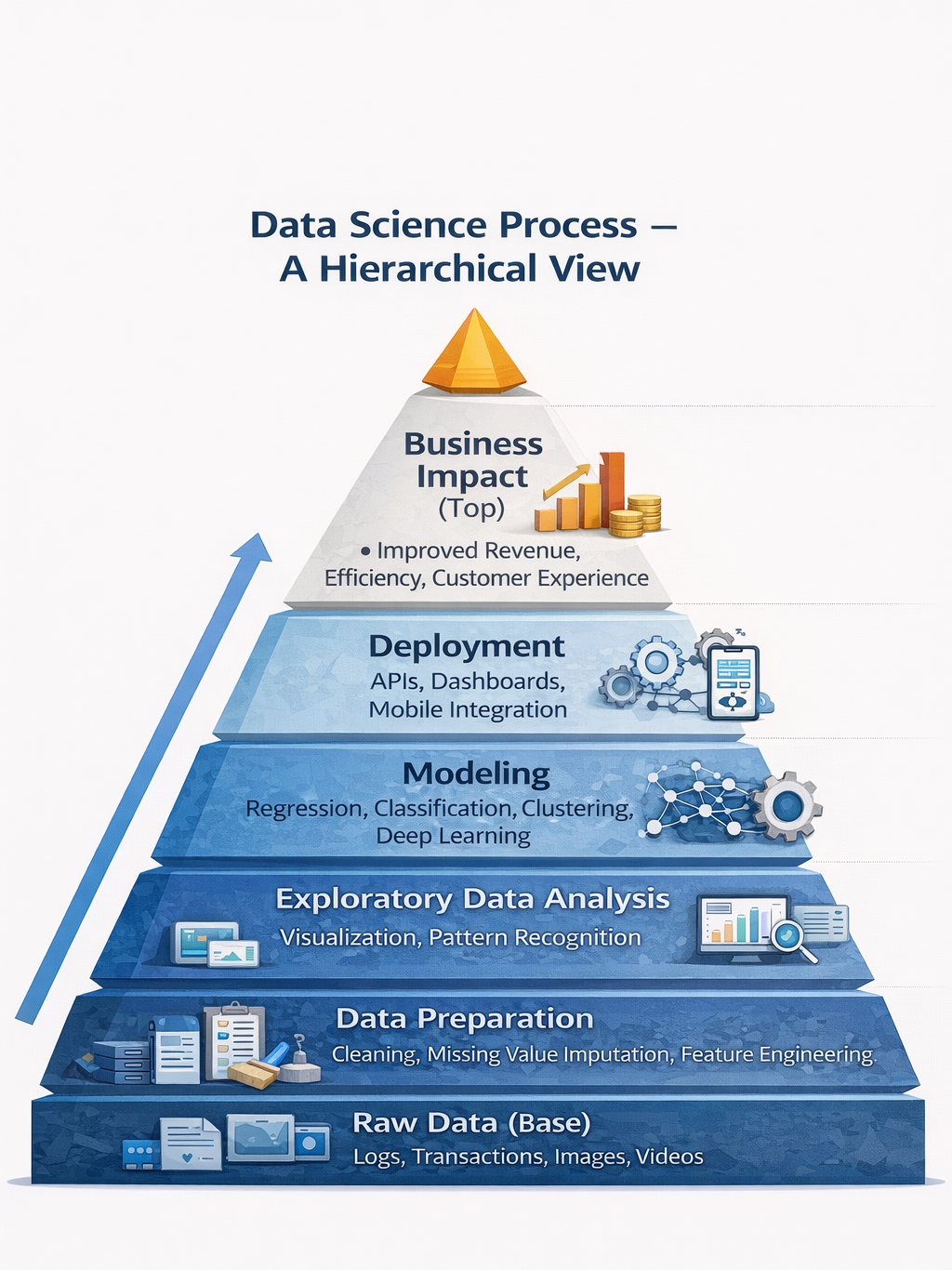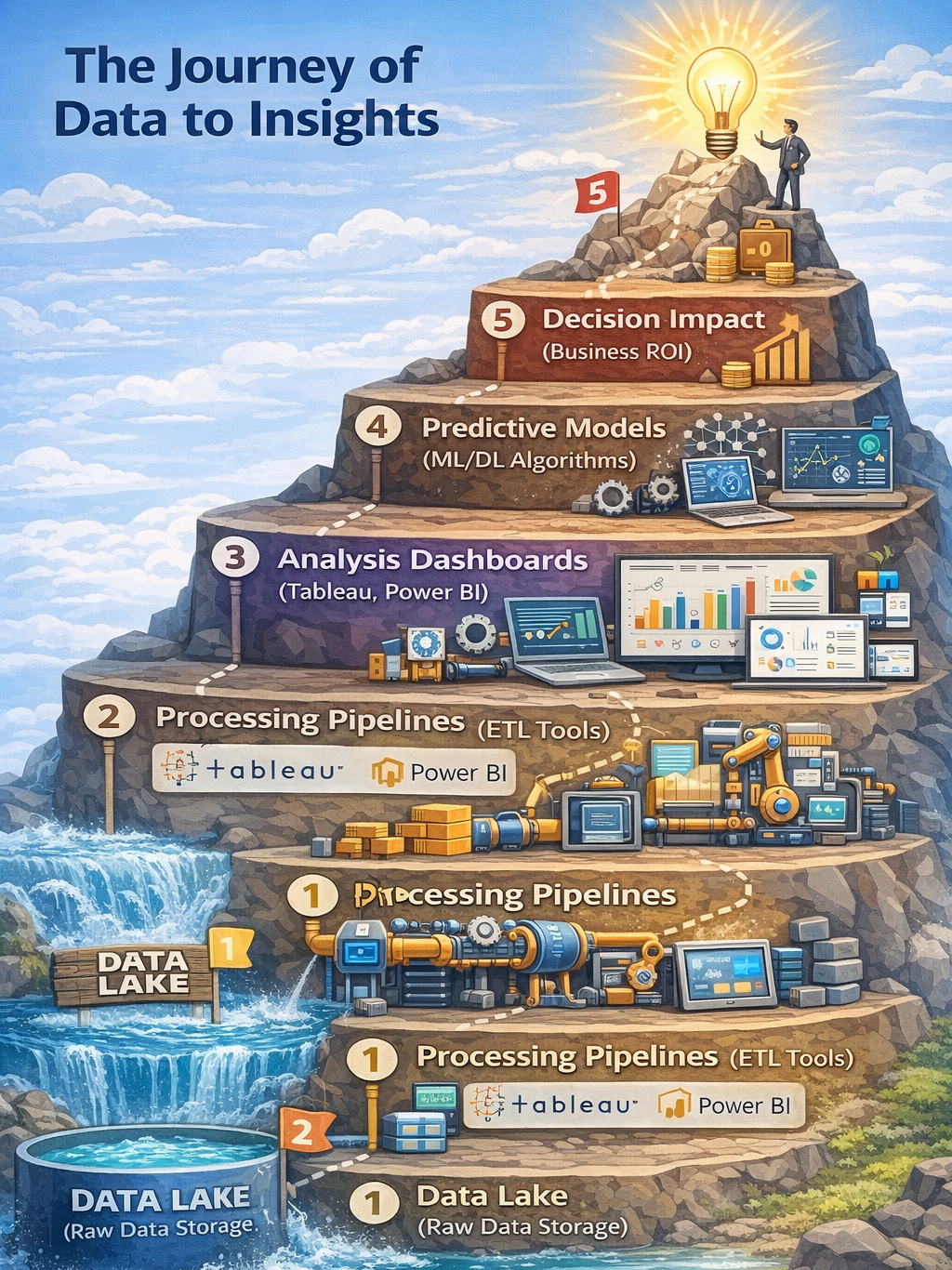The world of technology in 2025 is driven by one phrase: data is the new oil. But unlike oil, data is infinite, renewable, and constantly evolving. Every click on a website, every purchase in an online store, every swipe on a smartphone generates data. Companies across healthcare, finance, e-commerce, education, and even agriculture are racing to harness this data for better decisions.
This is where Data Science comes in—a multidisciplinary field that blends mathematics, statistics, programming, and domain knowledge to turn raw numbers into meaningful insights.
At Curiosity Tech, located at 1st Floor, Plot No 81, Wardha Rd, Gajanan Nagar, Nagpur, we believe in demystifying data science for everyone, whether you’re a student, a professional, or a business leader. With over 20 years of combined experience in the field, our team has trained thousands of learners and worked with enterprises to build real-world data-driven solutions.
What Exactly is Data Science?
Data Science is not just about crunching numbers—it’s about solving problems. At its core, it involves:
- Data Collection – Gathering structured (databases, spreadsheets) and unstructured (images, text, videos) data.
- Data Cleaning & Wrangling – Preparing messy, incomplete, or inconsistent data for analysis.
- Exploratory Data Analysis (EDA) – Understanding data patterns using visualization and summary statistics.
- Model Building – Applying machine learning and statistical models to make predictions or uncover hidden insights.
- Deployment & Monitoring – Turning models into usable applications for businesses.
- Ethics & Governance – Ensuring data is used responsibly, avoiding biases or privacy violations
Why 2025 is the Golden Era of Data Science
The last few years have witnessed an explosion in AI tools like ChatGPT, Bard, and open-source models. But while these tools are powerful, the expertise of a data scientist is irreplaceable.
Here are some reasons why Data Science in 2025 is more relevant than ever:
- Real-time decision making: Businesses now expect live insights, not quarterly reports.
- AI-powered automation: Industries like manufacturing and logistics depend on predictive analytics.
- Personalization at scale: E-commerce companies personalize recommendations for millions of customers in real time.
- Data security and governance: With stricter regulations (like GDPR, DPDP Act in India), companies need experts to ethically manage data.
Data Science Process – A Hierarchical View

- Raw Data (Base) – logs, transactions, images, videos.
- Data Preparation – cleaning, missing value imputation, feature engineering.
- Exploratory Data Analysis – visualization, pattern recognition
- Modeling – regression, classification, clustering, deep learning.
- Deployment – APIs, dashboards, mobile integration
- Business Impact (Top) – improved revenue, efficiency, customer experience.
This hierarchy reflects the step-by-step journey every data project undergoes.
Table: Data Science vs Traditional Analytics
| Feature | Traditional Analytics | Data Science in 2025 |
| Focus | Descriptive (what happened) | Predictive & Prescriptive (what will happen, what to do) |
| Tools | Excel, SQL | Python, R, TensorFlow, Spark |
| Data Type | Mostly structured | Structured + Unstructured (text, images, video, IoT) |
| Speed | Historical reports | Real-time, automated insights |
| Application | Business reporting | AI systems, personalization, robotics, fraud detection |
Real-World Example
Imagine an online education company in India. They collect data on:
- Student activity (course completion, time spent on videos)
- Assessments (quiz scores, assignment submissions)
- Behavior (logins, dropout rates, feedback)
Using Data Science, they can:
- Predict which students are likely to drop out.
- Personalize course recommendations
- Improve teaching strategies using feedback loops.
At Curiosity Tech, our team has worked on similar case studies where predictive analytics increased student engagement by 32%.
How to Become an Expert in Data Science in 2025
If you’re starting today, follow this roadmap:
- Mathematics & Statistics – Build strong fundamentals (probability, linear algebra, hypothesis testing).
- Programming – Learn Python (Pandas, NumPy, Matplotlib) and R for data manipulation.
- Data Handling – Understand SQL, Excel, and data wrangling tools.
- Machine Learning & Deep Learning – Explore algorithms, TensorFlow, Keras.
- Projects – Start with beginner projects like Titanic survival prediction or house price prediction.
- Soft Skills – Communication and storytelling with data are equally important.
- Certifications & Training – Platforms like CuriosityTech.in offer practical training programs designed for 2025’s industry needs.
Contact us via +91-9860555369 or contact@curiositytech.in to know about our live mentorship programs. We’re also active on Instagram (CuriosityTech Park), LinkedIn (Curiosity Tech), and Facebook (Curiosity Tech) to share free resources daily.
Abstract Infographic (described)

Conclusion
In 2025, Data Science is no longer optional—it is essential. Whether you’re an aspiring professional or a business looking to stay competitive, mastering data science opens limitless opportunities. With structured learning, real-world projects, and guidance from experts, you can future-proof your career.
And when it comes to practical training and real industry exposure, Curiosity Tech in Nagpur is empowering individuals and organizations to become data-driven leaders of tomorrow.



